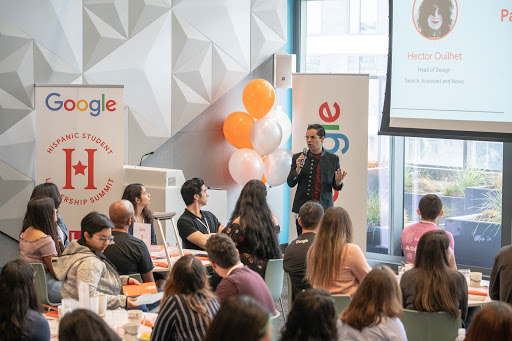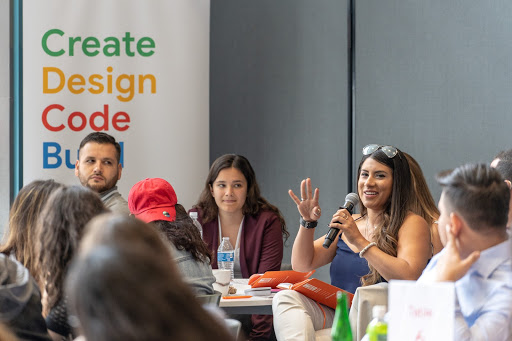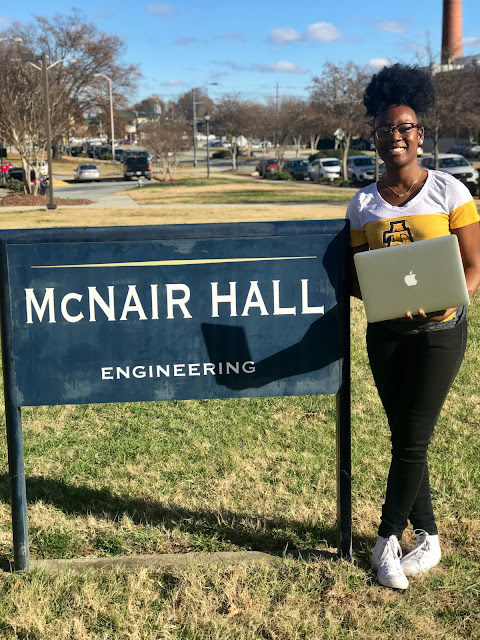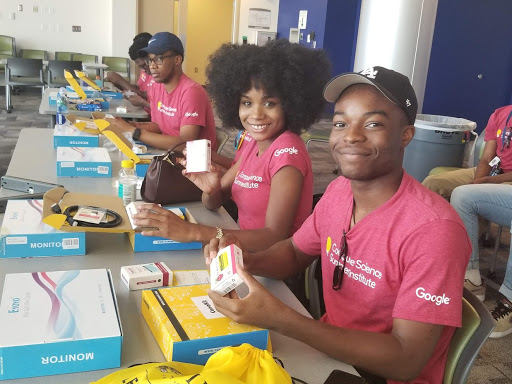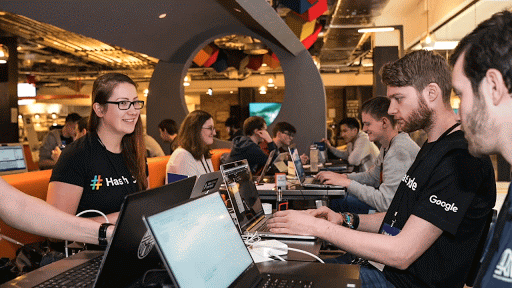Earlier this month, in partnership with the Hispanic Association of Colleges and Universities (HACU) and the Computing Alliance of Hispanic-Serving Institutions (CAHSI), 50 engineering and computer science student leaders from across the United States and Puerto Rico joined us in Austin, Texas for Google’s third annual Hispanic Student Leadership Summit (HSLS). The two days were filled with technical workshops, career discussions, lightning talks, and reflections on what it means to lead through Latinidad.
We gathered some of the biggest takeaways and pieces of advice from the summit below. Read on and visit buildyourfuture.withgoogle.com to stay in the loop on future student opportunities near you:
On navigating a career in tech:
“When I was struggling to figure out my career, I switched the framing and stopped worrying about what job I wanted to do and focused on what problems I wanted to solve.”
— Danyel Rios Printz, Google Senior User Experience Researcher
“I spent most of my career figuring it out, and I still am. It’s okay to be confused. Just follow what you’re good at and be transparent about that with everyone you meet.”
— Hector Ouilhet, Head of Design for Search, Assistant, and News at Google
“Hearing someone with 20 years of experience like Hector talk honestly about how confused he was early in his career and how he’s still figuring it out is inspirational to me. If he overcame hard times and confusion to get where he is today, then I can too.”
— Nuria Pacheco, student at Polytechnic University of Puerto Rico
“In college I didn’t let myself believe that I’d be good enough to work at Google. I rejected myself from opportunities before anyone else could but my biggest advice is don’t reject yourself. Believe that you are good enough.”
— Jessica Slaughter, Google Software Engineer
On leading through Latinidad:
“Recognize your lived experiences as your superpowers and use them to drive you — you’ll shape the future for your family, community, and the world.”
— Joshua Gutierrez, Google University Programs Specialist & Summit Co-Lead
“We must create a new model of leadership that is people-oriented, community-based, and inclusionary. Latino leadership is about participation and leadership by the many.”
— Erika Barrios, student at Florida International University
“Being a Latino leader is about being a beacon for others. I want to be that example of what’s possible. Through high school and college I felt like I had people I could emulate, but in my career I didn’t find that so I want to be that for others.”
— Esteban Morales, Google gTech Technical Lead
“We all come from different places and have gone through different struggles, and I believe that leading through Latinidad means using your pain as a virtue. When we run into pain, it can serve as a talking point for us as a community. For me, being comfortable with your struggle promotes conversation — your pain can be a virtue for not just for you, but for others.
— Immanuel Garcia, student at the University of Maryland, College Park
On the importance of mentorship and community:
“Mentors can come in many different shapes, sizes, and ages — so be open to different experiences. Some of my best mentors in life and career have been very unexpected.”
— Laura Marquez, Head of Latino Community Engagement at Google
“Seek out every opportunity to put yourself out there, even with situations that might make you uncomfortable. You never know who might cross your path and influence your career and life trajectory — and vice versa.”
— Jake Foley, Google University Programs Specialist & Summit Co-Lead
“Even within the Latinx community, there is so much complexity to our identities, but we still share a lot of core values. When we come together for a Latinx event, we celebrate the diversity among us, but our leadership abilities come from our deeper identities. There’s so much power that we take from that.”
— Jaqueline Villalpa Arroyo, student at the University of Arkansas at Little Rock
“Just like tech connects people from all over, we’re well equipped with our Latinidad to enhance connectivity among our peers. We can lead the world and tech industry towards the cognitive diversity that drives innovation and creativity.”
— Erika Barrios, student at Florida International University
We gathered some of the biggest takeaways and pieces of advice from the summit below. Read on and visit buildyourfuture.withgoogle.com to stay in the loop on future student opportunities near you:
On navigating a career in tech:
“When I was struggling to figure out my career, I switched the framing and stopped worrying about what job I wanted to do and focused on what problems I wanted to solve.”
— Danyel Rios Printz, Google Senior User Experience Researcher
“I spent most of my career figuring it out, and I still am. It’s okay to be confused. Just follow what you’re good at and be transparent about that with everyone you meet.”
— Hector Ouilhet, Head of Design for Search, Assistant, and News at Google
“Hearing someone with 20 years of experience like Hector talk honestly about how confused he was early in his career and how he’s still figuring it out is inspirational to me. If he overcame hard times and confusion to get where he is today, then I can too.”
— Nuria Pacheco, student at Polytechnic University of Puerto Rico
“In college I didn’t let myself believe that I’d be good enough to work at Google. I rejected myself from opportunities before anyone else could but my biggest advice is don’t reject yourself. Believe that you are good enough.”
— Jessica Slaughter, Google Software Engineer
On leading through Latinidad:
“Recognize your lived experiences as your superpowers and use them to drive you — you’ll shape the future for your family, community, and the world.”
— Joshua Gutierrez, Google University Programs Specialist & Summit Co-Lead
“We must create a new model of leadership that is people-oriented, community-based, and inclusionary. Latino leadership is about participation and leadership by the many.”
— Erika Barrios, student at Florida International University
“Being a Latino leader is about being a beacon for others. I want to be that example of what’s possible. Through high school and college I felt like I had people I could emulate, but in my career I didn’t find that so I want to be that for others.”
— Esteban Morales, Google gTech Technical Lead
“We all come from different places and have gone through different struggles, and I believe that leading through Latinidad means using your pain as a virtue. When we run into pain, it can serve as a talking point for us as a community. For me, being comfortable with your struggle promotes conversation — your pain can be a virtue for not just for you, but for others.
— Immanuel Garcia, student at the University of Maryland, College Park
On the importance of mentorship and community:
“Mentors can come in many different shapes, sizes, and ages — so be open to different experiences. Some of my best mentors in life and career have been very unexpected.”
— Laura Marquez, Head of Latino Community Engagement at Google
“Seek out every opportunity to put yourself out there, even with situations that might make you uncomfortable. You never know who might cross your path and influence your career and life trajectory — and vice versa.”
— Jake Foley, Google University Programs Specialist & Summit Co-Lead
“Even within the Latinx community, there is so much complexity to our identities, but we still share a lot of core values. When we come together for a Latinx event, we celebrate the diversity among us, but our leadership abilities come from our deeper identities. There’s so much power that we take from that.”
— Jaqueline Villalpa Arroyo, student at the University of Arkansas at Little Rock
“Just like tech connects people from all over, we’re well equipped with our Latinidad to enhance connectivity among our peers. We can lead the world and tech industry towards the cognitive diversity that drives innovation and creativity.”
— Erika Barrios, student at Florida International University
Be sure to follow @GoogleStudents (Twitter, Instagram, Facebook, YouTube) and visit buildyourfuture.withgoogle.com to stay in the loop on student opportunities — like when applications for next year’s summit open up!

